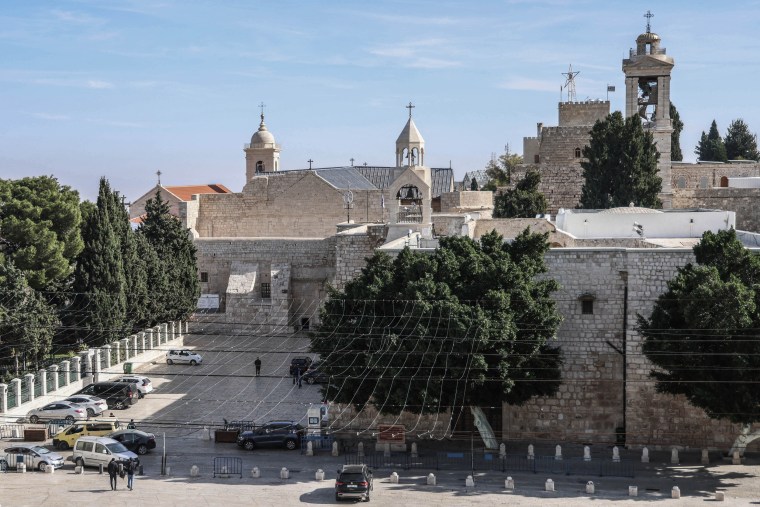More than two billion Christians around the world are celebrating Christmas this week, but those celebrations look very different in the place where Jesus Christ was born. Christian leaders in Bethlehem, which is located in the Israeli-occupied West Bank, decided to cancel public celebrations because of the devastating war in Gaza.
There was little joy in the Holy Land this year, and certainly little peace.
There was little joy in the Holy Land this year, and certainly little peace.
In the wake of Hamas’ brutal October 7 terror attack, neighborhoods across Gaza have come under sustained Israeli bombardment. The 800 to 1,000 Christians in Gaza are “under threat of extinction” from Israeli bombing, according to the Rev. Dr. Mitri Raheb. “We know that within this generation, Christianity will cease to exist in Gaza,” said Raheb, the president of Dar al-Kalima University in Bethlehem.
Tragedy has rocked Gaza’s tiny Christian community. An IDF rocket struck the Convent of the Sisters of Mother Theresa and two Christian women were shot dead while walking inside the grounds of the Holy Family Church on December 16, according to the Latin Patriarchate of Jerusalem. (The IDF has denied responsibility.)
“While Christians around the world are celebrating the Prince of Peace, Jesus Christ, Palestinian families in Gaza will be struggling to find food, shelter, and medicine, and trying to dig their loved ones out of the rubble,” Hassan El-Tayyab, legislative director for Middle East policy at the Quaker group Friends Committee on National Legislation, told MSNBC.
Cancelling Christmas in a Bethlehem is a drastic decision, one that should shock Christians around the world into paying attention to the pleas of Palestinian Christians.
“I always say we need to de-romanticize Christmas,” the Rev. Dr. Munther Isaac, pastor of the Evangelical Lutheran Christmas Church in Bethlehem said in an interview with NPR about the cancellation of Christmas festivities. “In reality, it’s a story of a baby who was born in the most difficult circumstances and the Roman Empire under occupation, who survived the massacre of children himself when he was born. So the connection was natural to us.”
In the United States, Christian calls for a ceasefire are also growing louder.
The same day the IDF reportedly killed two Christian women in Gaza, the U.S. Conference of Catholic Bishops called for “an immediate cessation of all hostilities, the release of hostages, and for earnest negotiations towards a peaceful resolution of this conflict.” The UCSSB tends to be much more conservative than Pope Francis, and the bishops' advocacy carries significant weight with the country’s second Catholic president. “We resolutely join our voices with the Holy Father, Pope Francis, reminding all parties in this conflict, that war is never the answer but always a defeat,” USCCB President Timothy P. Broglio said.
Pope Francis spoke directly to President Joe Biden by phone on October 22. The official White House readout of their conversation noted that they “discussed the need to prevent escalation in the region and to work toward a durable peace in the Middle East.”

Bishop William J. Barber II, director of the Yale Center for Public Theology and Public Policy and president of Repairers of the Breach, stressed the need for consistency by Christians. “When Hamas murdered, raped, and kidnapped civilians indiscriminately on October 7th, that was wrong,” he told me. “When Netanyahu’s government — not the Jewish people — responded with vengeful, indiscriminate bombing and killing, that was wrong too. Likewise, the atrocities that have been committed against Palestinian people for years are wrong. Antisemitism and violence are wrong. Islamophobia and violence are wrong.”
Barber also noted his interfaith allies in the cause of peace.
“As a Christian, I also can’t take a moral stand without recognizing that my siblings from other faith traditions share these concerns,” he said. “I have Jewish friends and Muslim friends who are just as committed to peace as I am — Jewish friends who deeply disagree with Netanyahu‘s approach; Muslim friends who deeply disagree with Hamas. As Christians, we must always do this together, in moral fusion, with Jewish, Muslim, and Christian siblings, because Jesus prayed that we might be one.”
And in this interfaith solidarity, perhaps, lies a small kernel of hope.
“Our faith in Christ reminds us that war is not the end of the story and that darkness and evil will not prevail,” the Rev. Dr. Mae Elise Cannon, executive director of Churches for Middle East Peace, told me. “We hold onto this truth as we pray for hostages to be returned home and for Palestinians in Gaza who are desperate for the bombing and ground invasion to end.”
The devastating toll of Israel’s war in Gaza is hard to fathom, and impossible to justify as a matter of Christian ethics.
One creative form of Christian peace activism has been Ceasefire Carols. Adapting traditional carols, the carolers have protested for a ceasefire across the country. Organizers Sarah Abbott and Anna Lemler explained to MSNBC that they started the project “in response to questions that were being raised by anti-Zionist Jewish organizers and by Palestinian, Arab, and Muslim organizers: Where are the large numbers of Christian people showing up against this genocide, for the return of hostages, and against the occupation of Palestine?”
The devastating toll of Israel’s war is hard to fathom, and impossible to justify as a matter of Christian ethics. So far, it is estimated that nearly 15,000 children have been killed or injured in Gaza. U.S. support for the war is also a policy decision that Americans, and American Christians in particular, have the political power to influence. We can help ensure that the sounds of celebration ring out in Bethlehem again.
“The call of Scripture, the example of Jesus, and the conviction of the Holy Spirit can never bow to the policies of any country,” Barber told me “We must speak the truth in love and repent when we don’t.”